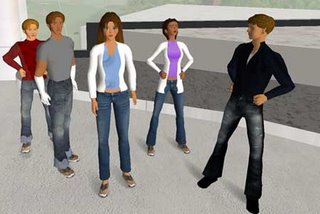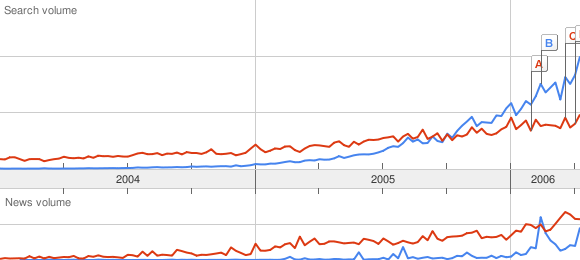We've moved
We have moved this blog to a local server... So, join us at our new site,and let us know what you think we should call our new blog.
What academic technologists and research librarians at Wheaton College (Norton, MA) are thinking about...
We have moved this blog to a local server... So, join us at our new site,and let us know what you think we should call our new blog.
A few of us from Wheaton began exploring Second Life together last week, and we've got another virtual meeting scheduled for this coming Thursday. Here's a group portrait from our last trip, taken at the NMC Campus:

Well, I have been neglecting this blog lately. I don't have much of an excuse... just busy, I guess.
There has been a lot of buzz around the net about Blackboard's recent lawsuit against Desire2Learn. Blackboard has played down the implications of the suit:
"This is not about limiting competition or innovation. This is not an acquisition," said Mr. Small, Blackboard's general counsel. "We are seeking a reasonable royalty." (from The Chronicle)
After purchasing and killing Prometheus in 2002 and WebCT last year (and many other companies, though not strictly speaking CMS/LMS companies), Blackboard seems to have a long-term strategy of not developing good or original technology but buying competitors and, now it is clear, trying to keep others out of the field by getting an absurdly broad patent for common uses of technology if that technology is employed in the context of education. Not only do we need to worry about the future of open source initiatives such as Moodle and Sakai, but we also need to worry about using a blog or wiki with a class of students. In fact, simple networking protocols, authentication practices, and the like, if undertaken by a school could well be jeapordized by this patent. (Peter Schilling on Academic Commons)
Sounds like a new dance, doesn't it!
Digg Stack shows diggs occuring in real time on up to 100 stories at once. As stories are dugg, they appear along the bottom of the screen, colored according to how popular they are. Users digging these stories appear as falling blocks that stack up as activity increases. The zoom level is adjustable, so you can focus in on the most recent stories, or pull back for a broader overview. You can also pause the visualization if it's flying by too quickly, or if you want to focus on a specific story more readily.
Digg Swarm is a more lyrical view of Digg. Stories come in as circles with the title inside of them, and diggers "swarm" around these stories when they digg them. Every time a story gets dugg, it increases in size — so the bigger the story, the more active it is. As people digg more stories, they move from circle to circle, and increase in size.I'm not sure what to do with this yet, but it sure looks cool. :-)
Saw this on Kairosnews
Ed Lamoureux from Bradley University is teaching an Undergraduate Course in Second Life at the Second Life NMC Campus this coming semester. He plans to write three installments for the NMC Campus Observer blog about preparing for the class. The first installment is already there and good reading!
I've been meaning to blog about this one for a while. Wheaton art professor, Andrew Howard is chronicling his and his students experiences at the Burren College of Art in Ireland on a Blogger blog:
Fifteen students and professors Andy Howard and Tim Cunard will be spending three weeks at Burren College of Art, which is located in one of Ireland's most picturesque regions.
I joined Second Life last night and spent quite a bit of time tweaking my avatar (Paul Story) and trying to get my bearings. Lots of wandering (and teleporting) around aimlessly.... er... I mean exploring! Some chatting with other newbies. It runs a bit on the slow side on my home computer (which is far from top of the line)... but a lot better than I expected. I seem to be able to move around and talk, listen to music, play games, watch movies, etc... all in real time. Sometimes the textures on objects take a little time to draw, but eventually I can see everything.

Been busy and vacationing lately. Now I need to get back in the habit of blogging!
If you are at all curious in using open source software for personal computing, these two sites that I ran across this morning seem like great places to start:
Open Source Mac/Open Source Windows is a simple list of the best free and open source software for Mac OS X/Windows. We aren't trying to be a comprehensive listing of every open-source mac/windows app, instead we want to showcase the best, most important, and easiest to use. This page should be a handy reference and a useful tool for getting more people to start using free and open-source software.
We may indeed be moving away from running desktop applications and toward using web applications in the future. There seem to be a lot of software developers out there banking on that idea anyway. Just a few examples: With Writely you can do all of your word processing online. Jotspot Tracker allows you to create spreadsheets online. Thumbstacks gives you PowerPoint-like presentations. And Gliffy lets you create diagrams and flowcharts.
I am often told in conversations about online gaming by the skeptics that one of the real problems with it is that the whole activity is really male dominated. Well, maybe not... According to this post on jill/txt, entitled the myth that women don’t play games:
Apparently 24-35 year olds are the heaviest gamers. According to a recent survey, 65% of women in this age bracket play games. Only 35% of men in the age bracket do. The survey found that women play “slightly less” console games than men and that many more women play casual games, like flash games in web browsers, solitaire or online Scrabble. They didn’t think to ask the women why they liked casual games, but assume that it’s because they’re non-violent and non-cometitive (they can’t have played many games at games.com). Great. Let’s just assume gender stereotypes instead of asking.
Interestingly, Nick Yee’s statistics from MMOGs show the same trend: while boys are clearly dominant among teenaged players, women players outnumber men for players above 23 years of age
Google Trends was launched yesterday:
With Google Trends, you can compare the world's interest in your favorite topics. Enter up to five topics and see how often they've been searched for on Google over time. Google Trends also displays how frequently your topics have appeared in Google News stories, and which geographic regions have searched for them most often.

Bryan Alexander posted last week about an art history professor's use of Flickr for one of her classes. In this example, students comment below and within the picture itself! Pretty slick.
Seven Things You Should Know about Podcasting: part of Educause's brochure series that I just happened across. Maybe we could use it as a handout at the upcoming faculty workshops?
At the beginning of last month NITLE published (on their website) an article about Visual Resources by Roger C. Schonfeld. Something worth a look as we continue to think about Digital Asset Management at Wheaton:
The findings are based on visits to seven liberal arts colleges in late 2004 and early 2005, which were designed to examine the role images play in teaching and learning. Although a number of campuses had developed viable strategies for the provision of digital images and the organizational plan and campus culture to support those strategies, several of the institutions we visited suffered from an organizational structure or campus culture that was ill-suited to take the strategic choices needed to encourage a transition to digital images. As the section on Campus Roles and Responsibilities explains at greater length, we saw two fundamentally different organizational models for the information services units that support image provision, one of which was much more successful than the other. [1] The role of the slide library or visual resources collection was the ultimate variable, and those campuses on which the slide library takes a campus-wide perspective (rather than serving the art history department alone) seem to see much easier and more successful transitions to digital images.
Google continues to make forays into web-based productivity software. Not long ago, they purchased Writely, the online word processor. Gmail is one of the best web-based email programs out there. Now there's Google Calendar. Features include: Calendar Sharing, Invitations, Gmail Integration, and of course Search.
It's a little ironic that I'm posting this now, since it showed up on Kevin Kelly's blog 15 days ago, but I guess we can't all be up to date all the time. ;-)
...each of these sites supplies readers with pointers to news items that are ranked by other readers. None of these sites generates news; they only point to it by filtering the links to newsy items. Using different formulas they rank an ever moving list of links on the web. The velocity of their lists varies by site, but some will have a 100% turnover in a few days.
This one looks interesting:
LibriVox: "LibriVox provides free audiobooks from the public domain."
Alan Levine has put together a nice wiki page with a bunch podcasting resources on it. He used it during a recent demo where he works (the Maricopa Community Colleges in Phoenix, AZ).
Here's another web-application-that-replaces-a-desktop application:
Wetpaint is the latest entry into the world of wiki hosting, and I am impressed. Check out the demo page if you get a chance and be sure to try out the editing functions. I can't think of a more elegant-looking easy-to-use wiki-editor.
I was wondering if this would happen. Google's email service is fantastic, better than any other webmail client that a college could offer, IMHO. And it looks like I am not the only one with that opinion. One school is now outsourcing their email support to Google. Will others follow?
While sitting and listening to a Ruckus demo today, Ken showed me Songbird, Mozilla's recent entry into the media player/organizer race. I haven't tried it yet, but I'm hoping it does what Firefox did for web browsing. Currently the download is Windows-only, but give them time... this is only version 0.1!
Found this blogging tool aimed at educational institutions. It might be worth a try: